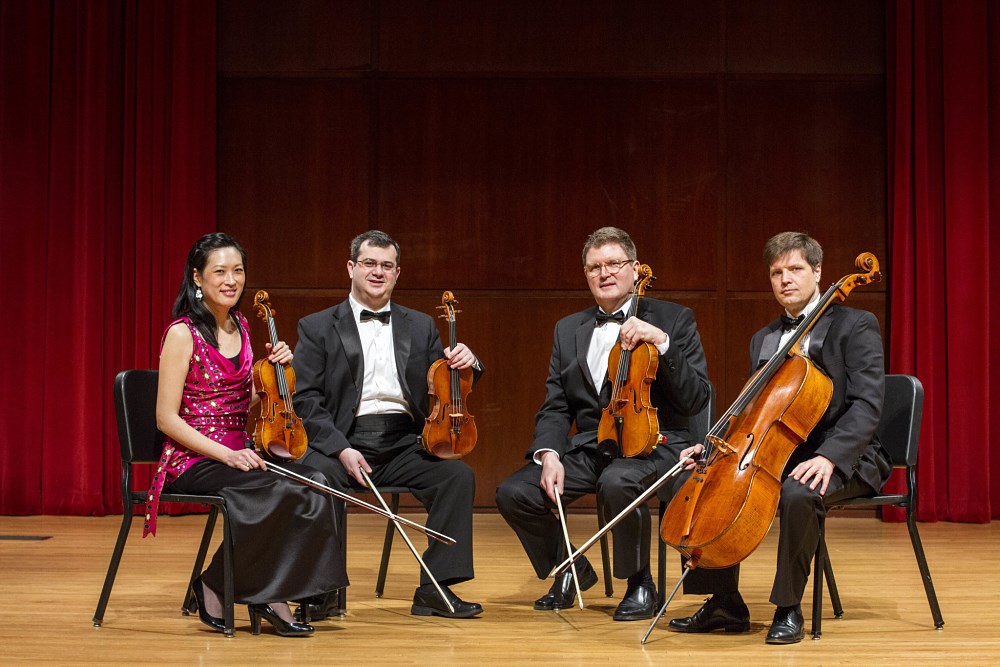Four Works About Friendship
Philomusica Quartet plays works by Schubert, Smetana, Puccini and Grant Still.
The Philomusica Quartet opens its 16th season on Monday, Oct. 9, with selections fitting the theme of friendship. Appropriately, the players (violinists Jeanyi Kim and Alexander Mandl, violist Nathan Hackett and cellist Adrien Zitoun) are the same four who came together in 2008 to explore the string quartet repertoire.
Four works are featured:
Franz Schubert (1897-1828) wrote at least 1,500 works in his short life. The Philomusica will play an early string quartet written for Schubert and his friends to play at home. The String Quartet No. 7 in D major, D. 94 reflects Schubert’s learning from Haydn and Beethoven, but the melodic gift apparent in his over 630 songs is evident in this consistently cheerful work.
William Grant Still (1895-1978) composed Quartetto Lyrico in 1960, with the subtitle “Musical Portraits of Three Friends.” It offers three short sketches of three very different personalities – sentimental, quiet, and jovial. Grant Still is best known for compositions celebrating African and African-American themes. These sketches offer a different perspective. The quiet movement is derived from an Inca melody. The portraits effectively communicate the emotional differences among these friends.
Giacomo Puccini (1858-1924) established his reputation as a great opera composer with works such as La Bohème, Tosca, Madama Butterfly and Turandot. He wrote I Crisantemi, SC65 (1890) for a string quartet as a tribute to the unexpected death of a close friend, Amadeo di Savoia, the former King of Spain. (Chrysanthemums are a traditional funeral flower in Italy.) The short elegy introduces two themes that reappeared in his opera Manon Lescaut.
Bedřich Smetana (1824-1884) composed his String Quartet No. 1 in E minor, “From My Life” in 1876 as a musical autobiography. Critic John Henken reflects that “this deliberate choice of a programmatic direction, though relatively rare in chamber music at the time, was a natural and instinctive one for Smetana. In the course of his operas and the great cycle of orchestral tone poems Ma Vlast, he had created templates for musical nationalism, portraying the people and places of Bohemia with vivid authenticity.”
Smetana reflects on the influences of Czech folk dances, his love for his wife, and concludes a tragic moment in his life when tendinitis struck, leaving him deaf. Smetana played the viola and assigns a prominent part to the viola throughout the quartet.
As Smetana described it, the finale presents the “perception of the beauty of national music, and the happiness resulting from this interrupted by my ominous catastrophe – the beginning of my deafness; the view into a tragic future, a slender ray of hope for improvement, but remembrance of the first beginnings of my path still creates a painful feeling. And that is why it is written purposely for four instruments, as though in a small friendly circle they are discussing among themselves what so obviously troubles me.”
Smetana’s work continued. He was totally deaf when he wrote Ma Vlast, known for its patriotic portrait of the Vltava (Moldau) River.
None of the works on this concert fit the traditional pattern of “absolute music.” They are expressive, theatrical, and rich with melodies. They allow the Philomusica Quartet more freedom to explore and interpret the music.
The Philomusica concert begins at 7:30 p.m. at Schwan Hall (8815 W. Wisconsin Ave.) on the Wisconsin Lutheran Campus on Monday, Oct. 9. Tickets may be purchased at the box office (414-443-8802) or online. Free parking is available in a garage just east of the hall.
The Philomusica Quartet’s next Wisconsin Lutheran concert will be on Feb. 12, featuring Melinda Lee Masur and recently appointed Milwaukee Symphony Orchestra Concert Master Jinwoo Lee. They will be featured in Ernest Chausson‘s gorgeous masterpiece, Concerto in D major for Violin, Piano, and String Quartet, Op. 21. Works by Anton Bruckner and Guillaume Lekeu are also on the program.
Preview
-
A Sacred Choir, 70 Voices Strong
 Dec 14th, 2025 by Martha Brown
Dec 14th, 2025 by Martha Brown
-
Prometheus Trio Goes Bohemian
 Dec 3rd, 2025 by Martha Brown
Dec 3rd, 2025 by Martha Brown
-
Present Music Offers New Choral Works
 Nov 20th, 2025 by Michael Barndt
Nov 20th, 2025 by Michael Barndt


















